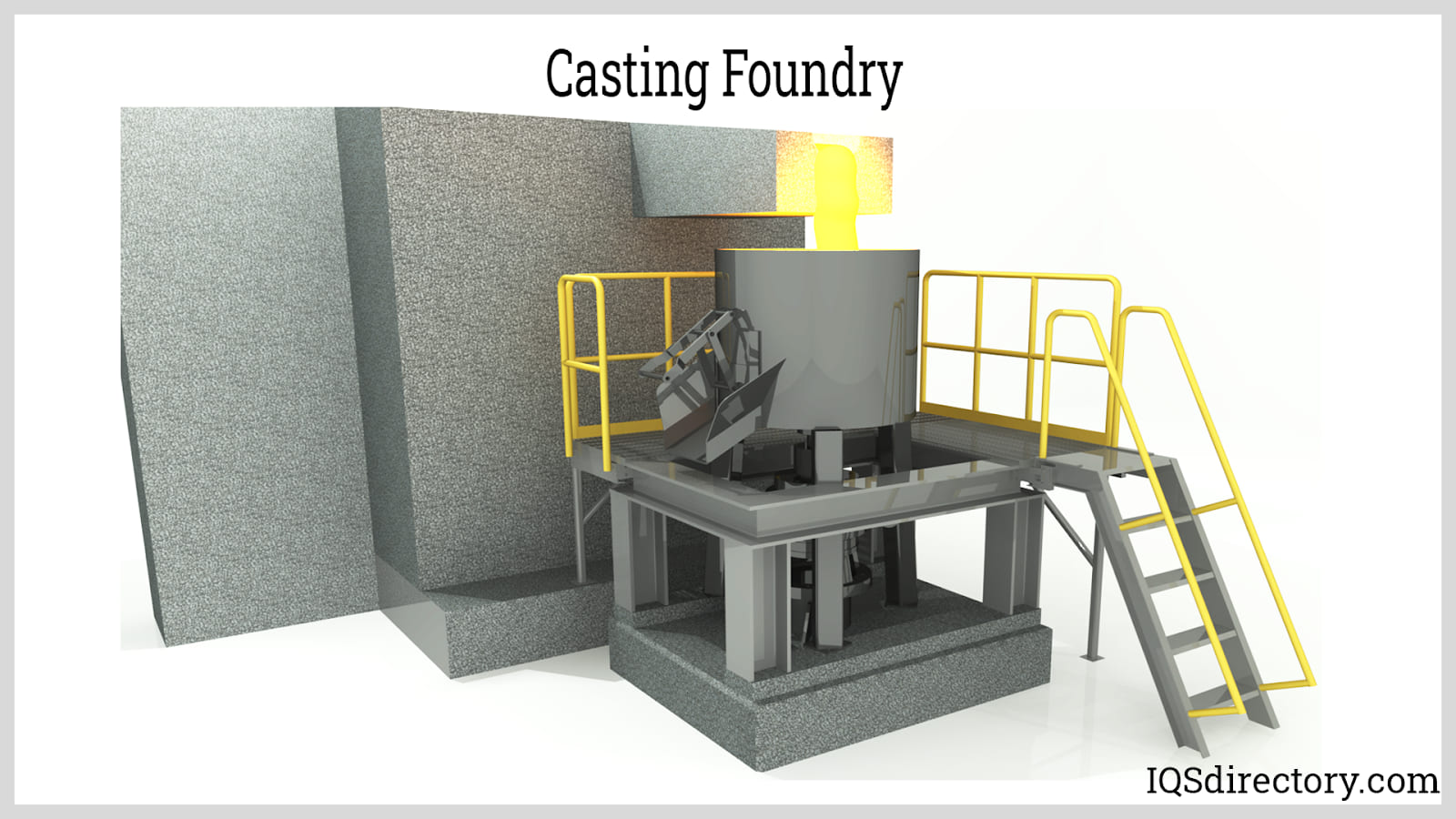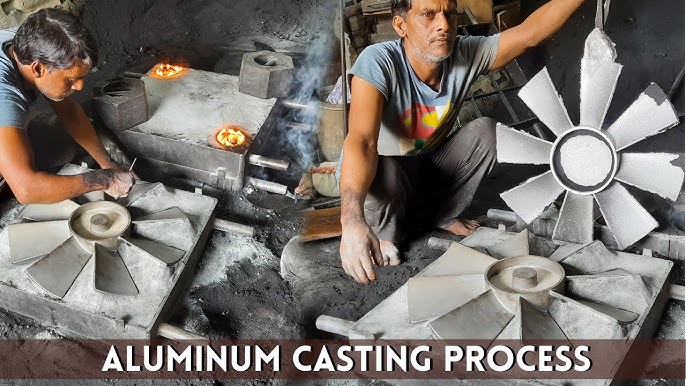Understand how Aluminum Foundry Wisconsin helps create better casting outcomes
Wiki Article
Comprehending the Conveniences and Innovations in the Aluminum Foundry Market
The Aluminum Foundry industry plays a necessary duty in contemporary manufacturing. Its lightweight buildings significantly improve fuel efficiency, particularly in automobile and aerospace sectors. Furthermore, Aluminum's resistance to deterioration warranties long life in numerous applications. As the market evolves, innovations such as sophisticated recycling and additive manufacturing are reshaping manufacturing methods. Exploring these developments discloses not just the benefits however likewise the obstacles ahead for Aluminum foundries in a quickly changing market.The Lightweight Benefit of Aluminum
Aluminum's light-weight nature uses considerable advantages across different markets, particularly in production and transportation. Its reduced density enables the manufacturing of elements that are much easier to install and manage, causing decreased labor costs and enhanced performance. In the auto industry, lighter automobiles contribute to boosted fuel economic situation and lower emissions, lining up with global sustainability objectives. Likewise, in aerospace, making use of Aluminum decreases the total weight of airplane, which is essential for boosting performance and lowering functional prices.Furthermore, Aluminum's light-weight buildings facilitate cutting-edge layouts that were previously impractical with larger materials. This flexibility enables suppliers to produce intricate forms and frameworks while maintaining structural integrity. Overall, the lightweight benefit of Aluminum not just enhances item efficiency however likewise drives developments in innovation and layout, making it a preferred product in various applications.
Corrosion Resistance and Resilience
The Aluminum Foundry market is renowned for generating products with exceptional corrosion resistance, making them ideal for various applications. This home, integrated with improved architectural stability, contributes to the lasting performance advantages that Aluminum components use. Therefore, industries progressively depend on Aluminum to satisfy requiring environmental conditions without jeopardizing high quality.
Superior Rust Resistance
While different steels face considerable difficulties from environmental elements, Aluminum attracts attention for its premium rust resistance, making it a preferred choice in several applications. This residential property is largely because of an all-natural oxide layer that bases on the Aluminum surface, supplying a barrier against dampness and destructive agents. Unlike other steels that may corrosion or degrade over time, Aluminum maintains its honesty even in rough atmospheres, such as commercial settings or coastal areas. In addition, its lightweight nature integrated with deterioration resistance makes it perfect for applications in aerospace, auto, and aquatic markets. In general, Aluminum's phenomenal toughness not just boosts product durability however also lowers upkeep expenses, presenting a compelling benefit for producers and customers alike.Enhanced Architectural Integrity
Engineers and developers progressively acknowledge the importance of boosted structural integrity in contemporary applications, where both rust resistance and sturdiness are critical. Aluminum alloys, known for their lightweight residential properties, likewise show extraordinary resistance to deterioration, making them appropriate for severe settings. The ingenious methods used in the Aluminum Foundry sector contribute substantially to generating parts with boosted longevity. Advanced casting procedures and alloy structures are customized to satisfy details efficiency demands, making certain that frameworks can hold up against severe problems without jeopardizing stability. In addition, surface therapies and finishings boost the lifespan of Aluminum items, better reducing degeneration over time. This focus on enhanced architectural integrity not only extends the usability of materials however likewise minimizes maintenance prices, strengthening Aluminum's placement as a material of option in different markets.Durable Efficiency Conveniences
Resilient performance in Aluminum elements is largely associated to their premium deterioration resistance and longevity. Unlike several metals, Aluminum naturally develops a safety oxide layer, which prevents corrosion and deterioration in different environments, including aquatic and commercial settings. This inherent residential or commercial property significantly extends the life expectancy of Aluminum products, decreasing maintenance and replacement expenses. On top of that, the lightweight nature of Aluminum boosts its applicability throughout markets without compromising strength. The material's resistance to damage also adds to its reliability in demanding applications, making it an excellent option for automobile, aerospace, and construction sectors. As sectors increasingly prioritize sustainability and longevity, Aluminum's performance benefits straighten with modern-day design requirements, strengthening its duty in cutting-edge manufacturing processes.Environmental Impact and Sustainability
 As the Aluminum Foundry industry develops, it significantly focuses on ecological impact and sustainability, acknowledging the demand for responsible techniques when faced with climate modification. Efforts to reduce waste and energy intake are at the forefront, with many shops adopting recycling initiatives to redeem Aluminum scrap. This not only minimizes raw product usage but likewise especially reduces down energy expense, as recycled Aluminum calls for just a portion of the power compared to main production.
As the Aluminum Foundry industry develops, it significantly focuses on ecological impact and sustainability, acknowledging the demand for responsible techniques when faced with climate modification. Efforts to reduce waste and energy intake are at the forefront, with many shops adopting recycling initiatives to redeem Aluminum scrap. This not only minimizes raw product usage but likewise especially reduces down energy expense, as recycled Aluminum calls for just a portion of the power compared to main production.Additionally, advancements in emissions manage innovations are being applied to lower air pollutants, lining up operations with stricter ecological laws. Factories are additionally checking out alternate energy sources, such as solar and wind, to power their facilities sustainably. By promoting cooperation with stakeholders, the sector aims to create innovative remedies that enhance eco-friendly stewardship. Jointly, these initiatives highlight a dedication to reducing the Aluminum Foundry's carbon impact while advertising a round economy within the manufacturing field.
Advanced Production Techniques
 Changing production procedures, the Aluminum Foundry sector is progressively integrating advanced production techniques to improve effectiveness and accuracy. Methods such as computer system mathematical control (CNC) machining and additive manufacturing have arised as essential parts in enhancing manufacturing workflows. CNC machining permits high-precision element fabrication, considerably minimizing material waste and production time. Additive manufacturing opens up brand-new opportunities for intricate geometries and lightweight designs that were formerly hard to attain.
Changing production procedures, the Aluminum Foundry sector is progressively integrating advanced production techniques to improve effectiveness and accuracy. Methods such as computer system mathematical control (CNC) machining and additive manufacturing have arised as essential parts in enhancing manufacturing workflows. CNC machining permits high-precision element fabrication, considerably minimizing material waste and production time. Additive manufacturing opens up brand-new opportunities for intricate geometries and lightweight designs that were formerly hard to attain.Furthermore, i thought about this the deployment of automation and robotics in Aluminum shops improves procedures, decreases human mistake, and enhances employee safety and security. These modern technologies help with a more receptive manufacturing atmosphere, allowing manufacturers to adapt swiftly to market needs. The integration of sophisticated simulation software program better enhances the design and testing phases, resulting in remarkable item top quality. Jointly, these methods not only improve functional effectiveness but likewise foster advancement, positioning the Aluminum Foundry sector at the center of modern-day production.
Developments in Reusing Procedures
The Aluminum Foundry industry is not only advancing in making techniques however is also making considerable strides in recycling processes. Technologies are emerging to boost the effectiveness of reusing approaches, lowering power usage and boosting sustainability. Advanced arranging technologies, such as computerized optical sorting, make it possible for the identification and splitting up of Aluminum from other materials with high precision. This causes a better of recycled Aluminum, which is important for preserving the honesty of the last items.
In addition, closed-loop recycling systems are being executed, permitting suppliers to reuse Aluminum scrap within their own manufacturing processes. This lessens waste and promotes a round economy. Furthermore, research study right into brand-new recycling methods, such as hydrometallurgical processes, provides the potential for recuperating Aluminum from intricate waste streams. These developments hop over to these guys not just add to decreasing the carbon footprint of the Aluminum Foundry sector however additionally reinforce its financial viability in an increasingly ecologically conscious market.
Applications Throughout Various Industries
Countless industries are significantly identifying the versatility and advantages of Aluminum Foundry items, resulting in prevalent applications across markets such as automotive, aerospace, construction, and customer items. In the vehicle industry, Aluminum spreadings contribute to light-weight automobile styles, enhancing fuel efficiency and efficiency. Aerospace suppliers utilize Aluminum components for their strength-to-weight proportion, essential for airplane structures and components.In building, Aluminum is preferred for its longevity and resistance to corrosion, making it perfect for home window frames, roofing, and architectural supports. Customer products additionally take advantage of Aluminum Foundry items, as seen in kitchenware, electronics, and packaging, where light-weight and recyclable materials are vital.
The flexibility of Aluminum Foundry strategies permits accurate specs and elaborate layouts, dealing with the varied requirements of these sectors. Consequently, Aluminum Foundry items are coming to be integral to contemporary manufacturing processes throughout various sectors.
Future Patterns in Aluminum Foundries
As markets remain to evolve, Aluminum factories are positioned to embrace numerous crucial trends that promise to improve efficiency and sustainability. One prominent pattern is the boosting fostering of electronic innovations, consisting of automation and artificial knowledge, which enhance operations and improve quality assurance. In enhancement, the press in the direction of sustainable methods is leading foundries to purchase recycling technologies, substantially decreasing waste and energy usage. An additional arising trend is making use of advanced alloys and materials, satisfying the growing demand for lightweight and resilient elements across different industries (Aluminum Foundry). Additionally, the integration of additive manufacturing strategies is anticipated to revolutionize component style, supplying modification and decreasing lead times
An additional arising trend is making use of advanced alloys and materials, satisfying the growing demand for lightweight and resilient elements across different industries (Aluminum Foundry). Additionally, the integration of additive manufacturing strategies is anticipated to revolutionize component style, supplying modification and decreasing lead timesPartnership with research organizations is additionally expected More Bonuses to drive development, as factories seek to create new procedures and products. Aluminum Foundry. Collectively, these patterns suggest a transformative future for the Aluminum Foundry industry, lining up with more comprehensive goals of sustainability and effectiveness
Frequently Asked Questions
What Are the Regular Expenses Related To Aluminum Foundry Production?
The common expenses related to Aluminum Foundry manufacturing consist of raw products, labor, power, devices upkeep, and overhead costs. These factors jointly influence the total monetary investment needed for effective Aluminum spreading procedures.Just How Does Aluminum Contrast to Various Other Metals in Strength?
Aluminum, while lighter than several steels, displays excellent strength-to-weight proportions. Contrasted to steel, Aluminum is less strong yet uses excellent deterioration resistance, making it a positive option in applications where weight and sturdiness are important.What Safety and security Measures Are in Location in Aluminum Foundries?
Precaution in Aluminum shops typically include required individual safety devices, ventilation systems to regulate fumes, routine devices maintenance, training programs for workers, and adherence to rigorous safety laws to lessen risks related to liquified metal handling.How Is Quality Assurance Managed in Aluminum Spreading Processes?
Quality control in Aluminum casting processes includes extensive evaluations at various phases, consisting of raw material analysis, procedure surveillance, and final item screening. Methods such as statistical process control and non-destructive screening guarantee adherence to market requirements.What Certifications Are Very Important for Aluminum Foundry Suppliers?
The significance of qualifications for Aluminum Foundry suppliers consists of ISO 9001 for high quality administration, ISO 14001 for ecological monitoring, and industry-specific standards like ASTM and SAE, guaranteeing compliance, safety, and dependability in manufacturing procedures.The Aluminum Foundry industry plays a necessary duty in contemporary manufacturing. The Aluminum Foundry market is renowned for creating products with exceptional deterioration resistance, making them optimal for numerous applications. Changing production processes, the Aluminum Foundry industry is significantly incorporating innovative manufacturing techniques to improve performance and accuracy. The Aluminum Foundry market is not only progressing in producing techniques but is additionally making substantial strides in recycling procedures. As markets continue to develop, Aluminum shops are positioned to accept several essential fads that promise to improve effectiveness and sustainability.
Report this wiki page